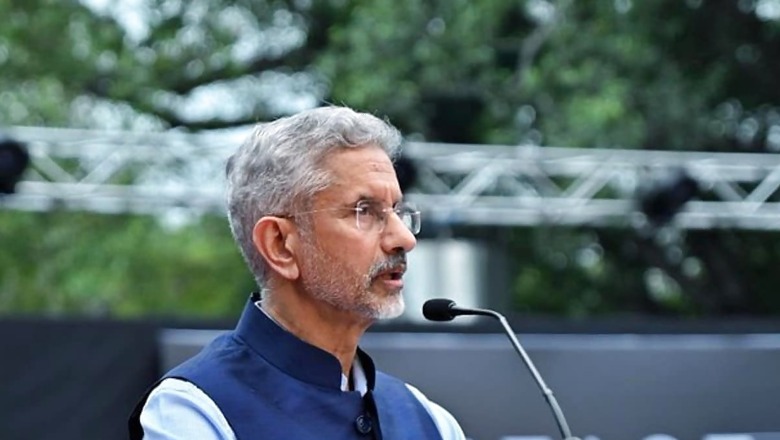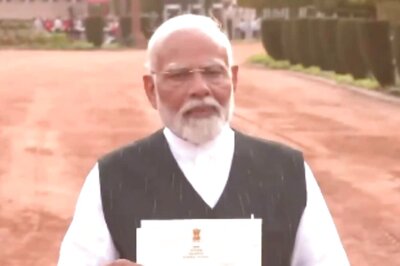
views
External Affairs Minister S Jaishankar on Saturday spoke about his interaction with Pakistan Foreign Minister Bilawal Bhutto Zardari during the Shanghai Cooperation Organisation Foreign Ministers’ meeting in Goa and said, “If I have a good guest, I am a good host”.
Speaking at the ‘Foreign Policy of Modi Government’ event in Mysore, Jaishankar objected to Foreign Minister Bhutto Zardari bringing up several issues at the SCO meeting. “Pakistan conducts terrorism and asserts its right to do terrorism,” he was quoted as saying by ANI news agency.
He said that Pakistan, as a member of SAARC, doesn’t “follow basic rules of international relations”, supports terrorism, and blocks connectivity.
Jaishankar emphasised that it is not in India’s interest to remain hostile towards Pakistan. “Not in our interest to be locked into perpetual hostility with Pakistan, nobody wants that,” he said adding that New Delhi “must draw and stand by its red lines.”
“If a neighbour attacks my city, I don’t think it should be business as usual,” he added.
The statement came a day after Jaishankar mounted an offensive against Bhutto Zardari, calling him “a promoter, justifier and a spokesperson of a terrorism industry.”
“As a foreign minister of an SCO member state, Bhutto-Zardari was treated accordingly. As a promoter, justifier and a spokesperson of a terrorism industry, which is the mainstay of Pakistan, his positions were called out and they were countered including at the SCO meeting itself,” Jaishankar had said.
Jaishankar had criticised Bhutto Zardari’s statement on terrorism not being “weaponised for diplomatic point-scoring”, which was seen as targeted towards India. Later, in a press conference, Jaishankar stated that the Pakistan foreign minister’s comment on terrorism “unconsciously revealed a mindset.”
Jaishankar Slams Rahul Gandhi Over China Policy
The external affairs minister launched a scathing attack against Congress leader Rahul Gandhi’s “does not understand the China threat” remark and quipped that he would have “offered” to take classes but he discovered the latter was taking lessons from the Chinese ambassador.
“I would have offered to take classes on China from Rahul Gandhi. But I discovered that he was taking classes on China from the Chinese ambassador. So I asked myself that I may as well go to the original source and talk to them,” Jaishankar said.
Jaishankar was referring to Gandhi’s meeting with the Chinese ambassador during the Doklam crisis to hit out at Gandhi’s statement against him at an event held by Indian Journalist’s Association in London in March.
“When asked about military threats facing India,” the former Congress president had said, “You have to deal with military threats militarily. But you have to understand the nature of the threat, and you have to respond to the nature of the threat. I had one conversation with the foreign minister in my view, he doesn’t understand the threat.”
Speaking at the event on Sunday, the external affairs minister emphasised the need for a collective responsibility to maintain India’s strong position abroad. “Unfortunately, foreign policy has also become an arena. I am not innocent and I am not saying that there should not be politics. Today I am in politics. I know everything in politics is political. But I think on certain issues, we have collective responsibility to behave in a way in which we do not weaken our collective position abroad,” he said.
He cited an example of a bridge built by the Chinese on Pangong Tso, stating that the area had been occupied by them in 1962. He mentioned the issue of so-called model villages built on areas lost before or during the 1962 war.
Jaishankar expressed his disappointment in reducing serious conversations on China to a mere “slanging match.” He did not attribute any political colour to the issue and called for a collective responsibility to have a serious China conversation with different viewpoints.
“What has happened has happened. It’s our collective, I would say failure or responsibility. I do not necessarily attribute political colouring to it. I would like to see is actually a serious China conversation. I’m prepared to accept that there are different viewpoints on that, but if you reduce it to kind of slanging match, what can I say after that?” he said.
In March, Jaishankar criticised Gandhi for his comments about China during the India Today Conclave in New Delhi.
The minister had said that it doesn’t make sense when people who are friendly towards China suddenly try to act tough on China. Jaishankar further pointed out that Gandhi had spoken admiringly about China’s Belt and Road Initiative (BRI), even comparing it to the Yellow River in China. “He compares, very poetically, I must say, the BRI with the Yellow River in China gushing forward. The BRI goes through Pakistan-occupied Kashmir. It violates our national integrity and sovereignty. He doesn’t have a word to say about it,” he had said.
Meanwhile, Gandhi has been vocal about his criticism of the BJP-led Centre’s handling of the India-China border issue. He has criticised Prime Minister Narendra Modi’s statement that “nobody has entered India territory,” following the scuffle in Galwan Vally in 2020 and termed it as an invitation for China to repeat its actions. “The Prime Minister’s statement that nobody has entered our territory shows that he does not understand the threat because the message to China with that statement is that they can do it again,” Gandhi had said.
Read all the Latest Politics News and Karnataka Elections 2023 updates here



















Comments
0 comment